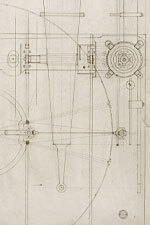National Maritime Museum Manuscripts
My friend Irwin's machine proves a mere bauble, not in the least useful for the purpose intended" Nevil Maskelyne, 1763

These manuscripts from the National Maritime Museum complement those from the Board of Longitude archive, either adding further official documentation relating to the activities of the Commissioners for the Longitude or less formal items that shed additional light on those activities. The papers of William Wildman, Viscount Barrington , for example, provide an interesting counterpoint to the official minutes of the Board of Longitude during its crucial deliberations in the 1760s.
The official documents include certificates from the Commissioners for the Longitude authorising payment from the Navy Board to individuals being given rewards or sums of money to help them participate in official trials. These include payments to John Harrison in 1761 and 1762 , the latter at the same time as a payment to Christopher Irwin, who received further payment the following year , as well as the rewards to Tobias Mayer and Leonhard Euler in 1765 for their part in making the lunar distance method practicable, and to Ralph Walker in 1795 for his compass . For the latter, there is also a written set of instructions for the compass.
There are several lieutenants' logs covering the sea trials of H1 in 1736 (including the log of Captain Proctor , who appears to have noted longitude by the sea clock), and the Barbados trials of 1763-64 in HMS Princess Louisa and HMS Tarter . In addition, there are three journals from voyages of exploration: James Cook's journals from HMS Endeavour in 1768-71 and HMS Resolution in 1772-75 , the latter complemented by Lieutenant Richard Pickersgill's journal from the same voyage . A group of copies of letters from Portsmouth dockyard also document some of the preparations for the 1761 trial of H4 to Jamaica.
There are two other large groups of manuscripts in the selection. The first is of manuscripts, including letters and memorandum books, belonging to Nevil Maskelyne . These include letters written from Barbados during the sea trials of 1763-64 and many letters to or from other astronomers. Other related documents include a letter from Maskelyne to a bookseller in 1770 concerning the Board's publications, and letters from Maskelyne to the Earl of Sandwich. The second large group is of papers from George Fisher, who was appointed as astronomer to two Arctic voyages, in 1818 and 1821-23. The selection includes a copy of a journal kept by one of the lieutenants on George Vancouver's expedition in 1793 , records of meteorological and other observations taken during the Arctic voyages, such as those in FIS/7 , and a number of volumes relating to his subsequent work on chronometers . There are also a number of navigational workbooks and records of lunar observations by Fisher and also John Franklin .
John Harrison is also well represented, in a copy of the 1770 edition of The Case of Mr. John Harrison, With accompanying notes by the Earl of Sandwich , the original manuscript of Harrison's final work , A Description Concerning Such Mechanism , and two drawings by Harrison, one of the turret clock escapement for Trinity College, Cambridge , the other showing a part of Harrison's third timekeeper , ( H3 ).
The remaining manuscripts include: a 1726 manuscript on finding longitude by Robert Wright, said to have been sent to Sir Isaac Newton; a 1734 scheme by William Whiston for finding longitude from eclipses of Jupiter's satellites; examples of preprinted forms for the lunar distance method that have been completed; examples illustrating the navigation carried out on an East India Company vessel at the beginning of the 19th century; letters from Andrew Mackay, a navigation teacher from Aberdeen who corresponded with Nevil Maskelyne. There is also a draft of his subsequently printed work , The theory and practice of finding the longitude at sea or on land (1793).
Richard Dunn
Royal Museums Greenwich
The 'splash' icons found in the descriptions are links to relevant items in the online collections of the Royal Museums Greenwich .




